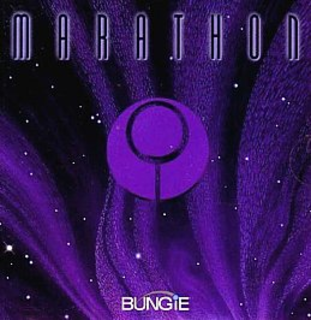A crucially important stepping-stone in the course of gaming.
One important aspect of Marathon is its subtle impact on gaming today. The obvious part of it being that its creator, Bungie, later went on to spawn the infamous Halo series-which directly reuses many features from Marathon. Examples would include its story-line involving an intergalactic alien empire attempting to conquer the Human race; playing through the eyes of a Cyborg soldier with heavy armor and shields, while being advised by various AIs; and several weapons used in the Halo arsenal (Spnkr, anyone?). But really, Marathon was a much smarter game than Halo is, and it's still superior to nearly all of today's modern FPS's in terms of story, atmosphere, and innovation.
The game is centered around a large colony spacecraft called the "Marathon" (hence the title), and is under siege by an armada of alien slavers-classified as "Pfhor." You-a security officer, who had little to do up until now-are the only hope left to defeating them. And shortly after this introduction as a cliche-fest, it quickly turns into a story about the struggle for power between the Marathon's three A.I.s - Leela, Tycho and Durandal.
A remarkable mechanic of Marathon's is its presentation of the A.I.s in the game: instead of having video files that display them giving voice-communication, they communicate through text in computer terminals throughout the game. These terminals are what tell the story, as well as give you directions on beating the various levels.
And through this, the A.I.s successfully show as much, if not more, emotion and wit as they could have through voice; they each have their distinct personality that gets across despite their lack of voice. There is Durandal-the sarcastic, rampant A.I. who couldn't care less about the fate of the Marathon, and is using its crew, as well as the Pfhor who besieged it, for his own ends; and then there's Tycho-an almost-destroyed intelligence who is attempting to do what he can for the ship's crew, but may have other intentions. And Leela-the only trustworthy character in the game.
The story-line is what helps drive the game's atmosphere; you really can belive that you are aboard a cold, damp ship with enemies lurking about, hunting you down. There were other shooters at the time-such as Doom, another classic-that had similar settings-but what they seriously lacked was atmosphere. Doom, for instance, was all run-and-gun, and was solely action-based; Marathon involves exploring and clearing out the levels, one room at a time, your eyes always on your motion tracker. This creates suspenseful, tense, and often quite scary game-play.
What I don't like about many other shooters is how they make many of the earlier weapons acquired quickly rendered entirely obsolete by the later weapons you add to your arsenal. In Marathon, each weapon has strengths that the rest don't-ven the basic melee attack. And another feature Marathon discovered before titles such as Half-life, would use of dual-triggers: several of the weapons have more than one form of firing-those being the Assault rifle's Grenade Launcher attachment, the Plasma pistol's overcharge, and being able to hold two pistols in your hands at once.
Marathon revolutionized the genre which Doom properly jump-started. It is more than likely that Halo wouldn't have existed-had Bungie not come out with Marathon earlier-and it is even arguable that games such as Half-life have an obvious influence from Marathon.
As you likely know, Marathon and its sequels are completely freeware and open-source, downloadable from _source.bungie.org_.
Its sequels are great on the revamped and improved open-source engine "Aleph One," which uses the source code of Marathon 2/Infinity. But as for the original, do yourself a favor and use a Mac emulator to run it on its original engine instead of on Aleph One.
The reason why? It's simple, really: the Aleph One version just isn't Marathon. Since the original Marathon's engine couldn't be ported to Aleph One, the original maps and bitmaps were remapped and reimported. I'm not sure why, but it just doesn't have the same feel as it did on its original engine; the numerous subtle changes aside - which I most definitely could ramble on about all day - it doesn't quite have the same atmosphere as it did on the Bungie-made maps and engine.
There's so much more I could go into about Marathon about its combat, architecture, philosophy and overall importance. But to summarize it, it's a classic; a masterpiece.

